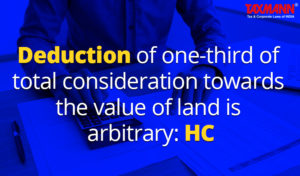Deduction of one-third of total consideration towards the value of land is arbitrary: HC
- Blog|News|GST & Customs|
- 2 Min Read
- By Taxmann
- |
- Last Updated on 9 May, 2022

Case Details: Munjaal Manishbhai Bhatt v. Union of India - [2022] 138 taxmann.com 117 (Gujarat)
Judiciary and Counsel Details
-
- J.B. Pardiwala & MS. Nisha M. Thakore, JJ.
- Uchit N Sheth for the Petitioner.
- Devang Vyas, Utkarsh Sharma and Priyank P. Lodhafor the Respondent.
Facts of the Case
The writ applicant was a practicing advocate and he entered into an agreement to purchase bungalow. A separate and distinct consideration was agreed upon between the parties to the agreement for the sale of land and construction of a bungalow on the land. He received an invoice levying tax at the rate of 9% CGST and 9% SGST on the entire consideration payable for land as well as construction of bungalow after deducting 1/3rd of the value towards the land. It filed writ petition to challenge the mandatory deduction of 1/3rd of total consideration towards the value of land as sale of land is neither supply of goods nor services.
High Court Held
The Honorable High Court observed that the paragraph 2 of the Notification No. 11/2017-Central Tax (Rate) dated 28.6.2017 provides for a mandatory fixed rate of deduction of 1/3rd of total consideration towards the value of land. Such deeming fiction is not only contrary to the scheme of the GST Acts but mandatory uniform rate of deduction is discriminatory, arbitrary and violative of Article 14 of the Constitution of India. It was also observed that when detailed statutory mechanism for determination of value is available then the impugned deeming fiction can’t be justified on the basis that it is meant to curb avoidance of tax when in fact such fiction is leading to arbitrary consequences. Thus, it was held that the mandatory deeming fiction for deduction of value of land was liable to be quashed and set aside.
Disclaimer: The content/information published on the website is only for general information of the user and shall not be construed as legal advice. While the Taxmann has exercised reasonable efforts to ensure the veracity of information/content published, Taxmann shall be under no liability in any manner whatsoever for incorrect information, if any.

Taxmann Publications has a dedicated in-house Research & Editorial Team. This team consists of a team of Chartered Accountants, Company Secretaries, and Lawyers. This team works under the guidance and supervision of editor-in-chief Mr Rakesh Bhargava.
The Research and Editorial Team is responsible for developing reliable and accurate content for the readers. The team follows the six-sigma approach to achieve the benchmark of zero error in its publications and research platforms. The team ensures that the following publication guidelines are thoroughly followed while developing the content:
- The statutory material is obtained only from the authorized and reliable sources
- All the latest developments in the judicial and legislative fields are covered
- Prepare the analytical write-ups on current, controversial, and important issues to help the readers to understand the concept and its implications
- Every content published by Taxmann is complete, accurate and lucid
- All evidence-based statements are supported with proper reference to Section, Circular No., Notification No. or citations
- The golden rules of grammar, style and consistency are thoroughly followed
- Font and size that’s easy to read and remain consistent across all imprint and digital publications are applied



 CA | CS | CMA
CA | CS | CMA
